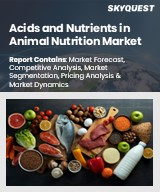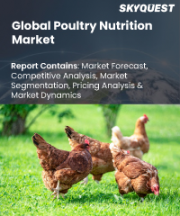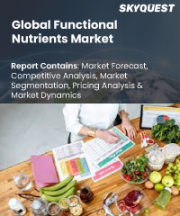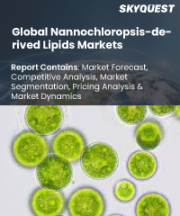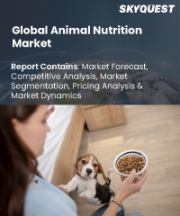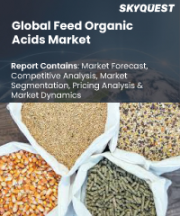
|
시장보고서
상품코드
1511284
동물 영양 시장 예측(-2030년) : 제품 유형별, 형태별, 기능별, 유형별, 최종 사용자별, 지역별, 지역별Animal Nutrition Market Forecasts to 2030 - Global Analysis By Product Type, Type, Form, Function, Species, End User and By Geography |
||||||
Stratistics MRC에 따르면, 세계 동물 영양 시장은 2024년 262억 달러에 이르고, 예측 기간 동안 연평균 8.9% 성장하여 2030년에는 437억 달러에 달할 것으로 예상됩니다.
동물 영양학은 동물이 성장, 유지, 번식 및 전반적인 건강을 위해 영양소를 섭취, 소화, 흡수 및 활용하는 방법을 연구하는 학문입니다. 동물 영양학은 다양한 종과 생리적 단계에 따른 식이 요구량, 사료 구성, 사료 공급 방법에 대한 이해를 포함합니다. 동물에게 필수적인 영양소에는 탄수화물, 단백질, 지방, 비타민, 미네랄, 수분 등이 있습니다. 동물사료에 포함된 이러한 영양소의 균형과 품질은 동물의 성능, 면역 기능 및 건강에 직접적인 영향을 미칩니다. 영양 불균형이나 결핍은 다양한 건강 문제, 생산성 저하, 질병에 대한 감수성 증가로 이어질 수 있습니다.
2차 분석에 따르면 2019년 유럽 국가들의 1인당 육류 소비량은 약 77.1kg이었습니다. 따라서 육류 소비 증가는 지역 전체의 동물 영양 시장의 성장을 가속할 것입니다.
전 세계 소비자들이 고품질 동물성 단백질을 찾고 있습니다.
고품질 동물성 단백질에 대한 전 세계 소비자들 수요 증가는 동물 영양 시장에 큰 영향을 미치고 있습니다. 이러한 수요는 육류, 유제품 및 계란 생산의 품질과 효율성을 높이기 위해 최적화된 동물 영양 전략이 필요하게 되었습니다. 건강에 대한 소비자의 관심이 높아지면서 균형 잡힌 영양을 갖춘 사료를 먹고 자란 동물성 제품을 선호하는 경향이 증가하고 있습니다. 이러한 추세는 환경 친화적인 사료 원료와 생산 방식을 채택하도록 유도하고, 보다 지속 가능한 솔루션을 위한 동물 영양 시장의 기술 혁신을 촉진할 것입니다.
원자재 가격 변동
곡물이나 단백질 공급원과 같은 주요 원료의 가격 변동은 공급망에 혼란을 초래하고 사료 생산 계획을 방해할 수 있습니다. 이러한 불확실성은 종종 사료 제조업체의 생산 비용 상승으로 이어져 소비자에게 전가될 수 있습니다. 또한, 가격 불안정성은 농가와 생산자의 수익성에 영향을 미쳐 가축의 영양 및 관리 방법에 대한 투자를 감소시킬 수 있습니다. 또한, 제조업체가 비용 상승을 억제하기 위해 저품질의 원료나 대체 원료를 사용하게 되어 품질 관리에도 지장을 초래할 수 있습니다.
동물 복지에 대한 관심 증가
소비자들은 식품 생산을 위해 사육되는 동물의 복지에 대한 관심이 높아지면서 윤리적으로 사육된 동물로부터 공급되는 제품에 대한 선호도가 높아지고 있습니다. 이러한 추세는 동물의 성능을 최적화할 뿐만 아니라 동물의 건강과 복지를 증진시키는 영양 솔루션에 대한 수요를 증가시키고 있습니다. 사료 제조업체들은 동물의 영양을 풍부하게 하고 스트레스 요인을 최소화하는 등 윤리적인 농업 관행에 부합하는 혁신적인 제품과 배합을 개발해야 하는 상황에 직면해 있습니다. 또한, 규제 당국은 동물 복지에 대한 보다 엄격한 기준과 인증을 시행하고 있으며, 이는 사료 배합 및 생산 공정에 영향을 미치고 있습니다.
건강 피해
많은 동물성 단백질은 지방 함량이 높기 때문에 과도하게 섭취하면 심혈관 질환, 고혈압, 인슐린 저항성 등 다양한 건강 문제를 악화시킬 수 있습니다. 동물성 단백질은 요산 생성을 촉진하여 건강 위험을 더욱 악화시킵니다. 또한 동물성 단백질 생산은 식물성 단백질에 비해 비용이 많이 드는 경향이 있습니다. 가축 사육에는 상당한 양의 물이 필요하며, 육우 한 마리에 5,000갤런 이상의 물이 필요합니다. 또한, 동물 사육 환경에 대한 윤리적 문제도 동물 영양 시장 확대에 걸림돌로 작용하고 있습니다. 이러한 문제들이 시장의 성장과 보급을 가로막고 있습니다.
COVID-19의 영향
초기에는 공급망의 혼란과 물류 문제가 사료 원료의 유통을 방해하여 동물사료의 생산과 공급에 영향을 미쳤습니다. 그러나 육류 및 유제품에 대한 수요 증가와 가정식으로의 소비자 선호도 변화와 결합하여 동물사료에 대한 수요가 증가했습니다. 팬데믹은 또한 식량 안보를 보장하는 데 있어 동물의 건강과 영양의 중요성을 강조하고 혁신적인 사료 솔루션의 연구 개발에 대한 투자를 촉진했습니다. 또한 원격 근무와 온라인 쇼핑의 부상으로 동물사료 및 영양 제품 구매에 디지털 플랫폼의 채택이 가속화되었습니다.
예측 기간 동안 항산화제 부문이 가장 큰 시장으로 성장할 것으로 예상됩니다.
항산화제는 세포 손상, 면역 기능 저하, 성장률 저하를 유발할 수 있는 활성산소로 인한 산화 스트레스로부터 동물 세포를 보호할 수 있기 때문에 이 부문은 유리한 성장세를 보일 것으로 추정됩니다. 항산화제를 사료에 첨가함으로써 생산자는 가축과 가금류의 전반적인 건강과 성능을 향상시킬 수 있습니다. 이는 사료 요구율 개선, 성장률 향상, 번식 능력 강화로 이어져 시장 성장을 가속할 수 있습니다.
성장 촉진제 부문은 예측 기간 동안 가장 높은 CAGR을 나타낼 것으로 예상됩니다.
항생제, 호르몬, 프로바이오틱스 및 프리바이오틱스와 같은 천연 화합물을 포함한 이러한 물질은 성장 속도를 가속화하고 사료 요구량을 개선하며 전반적인 생산성을 높이기 위해 동물사료에 첨가됩니다. 성장 촉진제를 사용하면 농부들은 더 빠른 성장과 더 높은 수확량을 달성할 수 있으며, 이는 동물성 단백질에 대한 전 세계 수요 증가에 대응하는 데 매우 중요합니다. 그 결과, 보다 효율적인 생산 시스템을 구축할 수 있으며, 가축을 시장 중량까지 키우는 데 필요한 시간과 자원을 줄일 수 있습니다.
가장 큰 점유율을 차지하는 지역 :
아시아태평양은 인구의 많고 다양성, 소득 수준 증가, 단백질이 풍부한 식품에 대한 식습관 변화로 인해 육류, 유제품, 계란과 같은 고품질 동물성 식품에 대한 수요가 증가함에 따라 예측 기간 동안 가장 큰 시장 점유율을 차지할 것으로 예상됩니다. 이러한 수요는 가축의 건강, 생산성 및 효율성을 향상시키기 위한 고급 동물 영양 솔루션의 필요성을 촉진하고 있습니다.
CAGR이 가장 높은 지역 :
북미는 쇠고기, 닭고기, 낙농, 양돈 등 축산업이 발달한 지역으로 예측 기간 동안 가장 높은 CAGR을 나타낼 것으로 예상됩니다. 기술 발전, 광범위한 조사 개발 이니셔티브, 동물 건강 및 복지에 대한 관심 증가 등의 요인이 북미 동물 영양 시장의 역동성에 기여하고 있습니다.
무료 맞춤형 서비스 :
이 보고서를 구독하는 고객은 다음과 같은 무료 맞춤화 옵션 중 하나를 사용할 수 있습니다.
- 기업 프로파일
- 추가 시장 기업의 종합적인 프로파일링(최대 3개사까지)
- 주요 기업의 SWOT 분석(최대 3개사)
- 지역 세분화
- 고객의 관심에 따른 주요 국가별 시장 추정치, 예측, CAGR(주: 타당성 확인에 따라 다름)
- 경쟁사 벤치마킹
- 제품 포트폴리오, 지리적 입지, 전략적 제휴를 기반으로 한 주요 기업 벤치마킹
목차
제1장 주요 요약
제2장 서문
- 개요
- 이해관계자
- 조사 범위
- 조사 방법
- 데이터 마이닝
- 데이터 분석
- 데이터 검증
- 조사 접근
- 조사 정보원
- 1차 조사 정보원
- 2차 조사 정보원
- 전제조건
제3장 시장 동향 분석
- 성장 촉진요인
- 성장 억제요인
- 기회
- 위협
- 제품 분석
- 최종사용자 분석
- 신흥 시장
- COVID-19의 영향
제4장 Porter의 Five Forces 분석
- 공급 기업의 교섭력
- 바이어의 교섭력
- 대체품의 위협
- 신규 진출업체의 위협
- 경쟁 기업간 경쟁 관계
제5장 세계의 동물 영양 시장 : 제품 유형별
- 아미노산
- 항산화물질
- EU Biotics
- 섬유 조직
- 효소
- 약용 사료첨가물
- 지질
- 지방산
- 비타민
- 미네랄
- 기타
제6장 세계의 동물 영양 시장 : 유형별
- 프리믹스
- 첨가물
- 보충제
- 믹스
- 특수 성분
- 기타
제7장 세계의 동물 영양 시장 : 형태별
- 액체
- 건조
- 펠릿
- 기타
제8장 세계의 동물 영양 시장 : 기능별
- 헬스 및 웰니스
- 성장 촉진제
- 소화기 건강
- 기능 향상제
- 식이보충제
- 기타
제9장 세계의 동물 영양 시장 : 유형별
- 반추동물
- 가금류
- 수산양식
- 돼지
제10장 세계의 동물 영양 시장 : 최종사용자별
- 사료 제조업체
- 수의
- 반려동물 사료 제조업체
- 축산 농가
- 기타
제11장 세계의 동물 영양 시장 : 지역별
- 북미
- 미국
- 캐나다
- 멕시코
- 유럽
- 독일
- 영국
- 이탈리아
- 프랑스
- 스페인
- 기타 유럽
- 아시아태평양
- 일본
- 중국
- 인도
- 호주
- 뉴질랜드
- 한국
- 기타 아시아태평양
- 남미
- 아르헨티나
- 브라질
- 칠레
- 기타 남미
- 중동 및 아프리카
- 사우디아라비아
- 아랍에미리트(UAE)
- 카타르
- 남아프리카공화국
- 기타 중동 및 아프리카
제12장 주요 발전
- 계약/파트너십/협업/합작투자(JV)
- 인수와 합병
- 신제품 발매
- 사업 확대
- 기타 주요 전략
제13장 기업 프로파일링
- Adisseo
- ADM
- Alltech
- Archer-Daniels-Midland Company
- BASF
- Biomin
- Cargill Inc
- CJ Group
- DowDuPont
- DSM
- Evonik
- Global Bio-Chem
- Kemin Industries
- Lonza
- Meihua Group
- Novozymes
- Novus International
- Nutreco
- Sumitomo Chemical
LSH 24.07.19
According to Stratistics MRC, the Global Animal Nutrition Market is accounted for $26.2 billion in 2024 and is expected to reach $43.7 billion by 2030 growing at a CAGR of 8.9% during the forecast period. Animal nutrition is the study of how animals consume, digest, absorb, and utilize nutrients for growth, maintenance, reproduction, and overall health. It encompasses the understanding of dietary requirements, feed composition, and feeding practices tailored to different species and physiological stages. Essential nutrients for animals include carbohydrates, proteins, fats, vitamins, minerals, and water. The balance and quality of these nutrients in animal diets directly impact their performance, immune function, and well-being. Nutritional imbalances or deficiencies can lead to various health issues, decreased productivity, and increased susceptibility to diseases.
According to secondary analysis, in 2019, the per capita consumption of meat in European countries was around 77.1 kg. Thus, the increasing consumption of meat will drive the growth of the animal nutrition market across the regions.
Market Dynamics:
Driver:
Consumers around the world are increasingly demanding high-quality animal protein
The increasing demand for high-quality animal protein from consumers around the world has a significant impact on the animal nutrition market. This demand drives the need for optimized animal nutrition strategies to enhance the quality and efficiency of meat, dairy, and egg production. As consumers become more health-conscious, there is a growing preference for products derived from animals raised on balanced and nutritious diets. This trend encourages the adoption of environmentally friendly feed ingredients and production methods, driving innovation in the animal nutrition market towards more sustainable solutions.
Restraint:
Price volatility of raw materials
Fluctuations in the costs of key ingredients such as grains and protein sources can disrupt supply chains and hinder planning for feed production. This uncertainty often leads to increased production costs for feed manufacturers, which may then be passed on to consumers. Moreover, price instability can impact the profitability of farmers and producers, potentially leading to reduced investments in animal nutrition and management practices. Quality control may also suffer as manufacturers may be forced to use lower quality or alternative ingredients to mitigate rising costs.
Opportunity:
Increased focus on animal welfare
Consumers are increasingly concerned about the well-being of animals raised for food production, leading to a shift in preferences towards products sourced from ethically treated animals. This trend drives the demand for nutritional solutions that not only optimize animal performance but also promote their health and welfare. Feed manufacturers are compelled to develop innovative products and formulations that align with ethical farming practices, such as providing enriched diets and minimizing stressors. Additionally, regulatory bodies are implementing stricter standards and certifications related to animal welfare, influencing feed formulation and production processes.
Threat:
Health hazards
The inclusion of high fat content in many animal proteins can exacerbate various health issues like cardiovascular disease, hypertension, and insulin resistance when consumed excessively. Animal proteins accelerate the production of uric acid, further compounding health risks. Additionally, the production of animal proteins tends to be more expensive compared to plant proteins. Considerable amounts of water are also required in livestock farming, with a single beef cow requiring over 5,000 gallons of water. Moreover, ethical concerns surrounding the conditions in which animals are raised pose further obstacles to the expansion of the animal nutrition market. These challenges hinder the market's growth and adoption.
Covid-19 Impact
Initially, disruptions in supply chains and logistical challenges impeded the distribution of feed ingredients, affecting production and availability of animal feed. However, increased demand for meat and dairy products, coupled with shifts in consumer preferences towards home-cooked meals, bolstered the demand for animal feed. The pandemic also highlighted the importance of animal health and nutrition in ensuring food security, driving investment in research and development of innovative feed solutions. Additionally, the rise of remote work and online shopping accelerated the adoption of digital platforms for purchasing animal feed and nutritional products.
The antioxidants segment is expected to be the largest during the forecast period
The antioxidants segment is estimated to have a lucrative growth, as these compounds protect animal cells from oxidative stress caused by free radicals, which can lead to cell damage, weakened immune function, and reduced growth rates. By incorporating antioxidants into animal feed, producers can improve the overall well-being and performance of livestock and poultry. This leads to better feed conversion ratios, improved growth rates, and enhanced reproductive performance driving the markets growth.
The growth promoters segment is expected to have the highest CAGR during the forecast period
The growth promoters segment is anticipated to witness the highest CAGR growth during the forecast period, these substances, which include antibiotics, hormones, and natural compounds like probiotics and prebiotics, are added to animal feed to accelerate growth rates, improve feed conversion ratios, and increase overall productivity. The use of growth promoters helps farmers achieve faster growth and higher yields, which is crucial for meeting the rising global demand for animal protein. These results in more efficient production systems, reducing the time and resources needed to raise livestock to market weight.
Region with largest share:
Asia Pacific is projected to hold the largest market share during the forecast period owing to its large and diverse population, rising income levels, and shifting dietary preferences towards protein-rich foods, there is an increasing demand for high-quality animal products such as meat, dairy, and eggs. This demand fuels the need for advanced animal nutrition solutions to enhance livestock health, productivity, and efficiency.
Region with highest CAGR:
North America is projected to have the highest CAGR over the forecast period, as the region is characterized by a well-established livestock industry, including beef, poultry, dairy, and swine production. Factors such as technological advancements, extensive research and development initiatives, and a growing focus on animal health and welfare contribute to the dynamism of the animal nutrition market in North America.
Key players in the market
Some of the key players in the Animal Nutrition Market include Adisseo, ADM, Alltech, Archer-Daniels-Midland Company, BASF, Biomin, Cargill Inc, CJ Group, DowDuPont, DSM, Evonik, Global Bio-Chem, Kemin Industries, Lonza, Meihua Group, Novozymes, Novus International, Nutreco and Sumitomo Chemical
Key Developments:
In April 2024, ADM Animal Nutrition Expands Recall to Include 17 Additional Lots of Chicken, Swine and Rabbit Feed Products. Specific lots may contain elevated levels of magnesium, sodium, calcium and/or phosphorus; may harm chickens, swine, rabbits
In December 2023, Adisseo announces the appointment of dr hao zhigang as chief executive officer to succeed to jean-marc dublanc. This succession, well anticipated and prepared, ensures a smooth transition to maintain and strengthen Adisseo's strategy and organization.
In December 2023, Adisseo is building a new powder methionine plant in china, consolidating its leadership in methionine industry. The total investment amount is expected to be around RMB 4.9 billion.
Product Types Covered:
- Amino Acids
- Antioxidants
- EU Biotics
- Fiber
- Enzymes
- Medicated Feed Additives
- Lipids
- Fatty Acids
- Vitamins
- Minerals
- Other Product Types
Types Covered:
- Premixes
- Additives
- Supplements
- Mixes
- Specialty Ingredients
- Other Types
Forms Covered:
- Liquid
- Dry
- Pellets
- Other Forms
Functions Covered:
- Health and Wellness
- Growth Promoters
- Digestive Health
- Performance Enhancers
- Nutritional Supplements
- Other Functions
Species Covered:
- Ruminant
- Poultry
- Aquaculture
- Swine
End Users Covered:
- Feed Manufacturers
- Veterinarians
- Pet Food Manufacturers
- Livestock Farmers
- Other End Users
Regions Covered:
- North America
- US
- Canada
- Mexico
- Europe
- Germany
- UK
- Italy
- France
- Spain
- Rest of Europe
- Asia Pacific
- Japan
- China
- India
- Australia
- New Zealand
- South Korea
- Rest of Asia Pacific
- South America
- Argentina
- Brazil
- Chile
- Rest of South America
- Middle East & Africa
- Saudi Arabia
- UAE
- Qatar
- South Africa
- Rest of Middle East & Africa
What our report offers:
- Market share assessments for the regional and country-level segments
- Strategic recommendations for the new entrants
- Covers Market data for the years 2022, 2023, 2024, 2026, and 2030
- Market Trends (Drivers, Constraints, Opportunities, Threats, Challenges, Investment Opportunities, and recommendations)
- Strategic recommendations in key business segments based on the market estimations
- Competitive landscaping mapping the key common trends
- Company profiling with detailed strategies, financials, and recent developments
- Supply chain trends mapping the latest technological advancements
Free Customization Offerings:
All the customers of this report will be entitled to receive one of the following free customization options:
- Company Profiling
- Comprehensive profiling of additional market players (up to 3)
- SWOT Analysis of key players (up to 3)
- Regional Segmentation
- Market estimations, Forecasts and CAGR of any prominent country as per the client's interest (Note: Depends on feasibility check)
- Competitive Benchmarking
- Benchmarking of key players based on product portfolio, geographical presence, and strategic alliances
Table of Contents
1 Executive Summary
2 Preface
- 2.1 Abstract
- 2.2 Stake Holders
- 2.3 Research Scope
- 2.4 Research Methodology
- 2.4.1 Data Mining
- 2.4.2 Data Analysis
- 2.4.3 Data Validation
- 2.4.4 Research Approach
- 2.5 Research Sources
- 2.5.1 Primary Research Sources
- 2.5.2 Secondary Research Sources
- 2.5.3 Assumptions
3 Market Trend Analysis
- 3.1 Introduction
- 3.2 Drivers
- 3.3 Restraints
- 3.4 Opportunities
- 3.5 Threats
- 3.6 Product Analysis
- 3.7 End User Analysis
- 3.8 Emerging Markets
- 3.9 Impact of Covid-19
4 Porters Five Force Analysis
- 4.1 Bargaining power of suppliers
- 4.2 Bargaining power of buyers
- 4.3 Threat of substitutes
- 4.4 Threat of new entrants
- 4.5 Competitive rivalry
5 Global Animal Nutrition Market, By Product Type
- 5.1 Introduction
- 5.2 Amino Acids
- 5.3 Antioxidants
- 5.4 EU Biotics
- 5.5 Fiber
- 5.6 Enzymes
- 5.7 Medicated Feed Additives
- 5.8 Lipids
- 5.9 Fatty Acids
- 5.10 Vitamins
- 5.11 Minerals
- 5.12 Other Product Types
6 Global Animal Nutrition Market, By Type
- 6.1 Introduction
- 6.2 Premixes
- 6.3 Additives
- 6.4 Supplements
- 6.5 Mixes
- 6.6 Specialty Ingredients
- 6.7 Other Types
7 Global Animal Nutrition Market, By Form
- 7.1 Introduction
- 7.2 Liquid
- 7.3 Dry
- 7.4 Pellets
- 7.5 Other Forms
8 Global Animal Nutrition Market, By Function
- 8.1 Introduction
- 8.2 Health and Wellness
- 8.3 Growth Promoters
- 8.4 Digestive Health
- 8.5 Performance Enhancers
- 8.6 Nutritional Supplements
- 8.7 Other Functions
9 Global Animal Nutrition Market, By Species
- 9.1 Introduction
- 9.2 Ruminant
- 9.3 Poultry
- 9.4 Aquaculture
- 9.5 Swine
10 Global Animal Nutrition Market, By End User
- 10.1 Introduction
- 10.2 Feed Manufacturers
- 10.3 Veterinarians
- 10.4 Pet Food Manufacturers
- 10.5 Livestock Farmers
- 10.6 Other End Users
11 Global Animal Nutrition Market, By Geography
- 11.1 Introduction
- 11.2 North America
- 11.2.1 US
- 11.2.2 Canada
- 11.2.3 Mexico
- 11.3 Europe
- 11.3.1 Germany
- 11.3.2 UK
- 11.3.3 Italy
- 11.3.4 France
- 11.3.5 Spain
- 11.3.6 Rest of Europe
- 11.4 Asia Pacific
- 11.4.1 Japan
- 11.4.2 China
- 11.4.3 India
- 11.4.4 Australia
- 11.4.5 New Zealand
- 11.4.6 South Korea
- 11.4.7 Rest of Asia Pacific
- 11.5 South America
- 11.5.1 Argentina
- 11.5.2 Brazil
- 11.5.3 Chile
- 11.5.4 Rest of South America
- 11.6 Middle East & Africa
- 11.6.1 Saudi Arabia
- 11.6.2 UAE
- 11.6.3 Qatar
- 11.6.4 South Africa
- 11.6.5 Rest of Middle East & Africa
12 Key Developments
- 12.1 Agreements, Partnerships, Collaborations and Joint Ventures
- 12.2 Acquisitions & Mergers
- 12.3 New Product Launch
- 12.4 Expansions
- 12.5 Other Key Strategies
13 Company Profiling
- 13.1 Adisseo
- 13.2 ADM
- 13.3 Alltech
- 13.4 Archer-Daniels-Midland Company
- 13.5 BASF
- 13.6 Biomin
- 13.7 Cargill Inc
- 13.8 CJ Group
- 13.9 DowDuPont
- 13.10 DSM
- 13.11 Evonik
- 13.12 Global Bio-Chem
- 13.13 Kemin Industries
- 13.14 Lonza
- 13.15 Meihua Group
- 13.16 Novozymes
- 13.17 Novus International
- 13.18 Nutreco
- 13.19 Sumitomo Chemical
- 추가 시장 기업의 종합적인 프로파일링(최대 3개사까지)
- 주요 기업의 SWOT 분석(최대 3개사)
- 고객의 관심에 따른 주요 국가별 시장 추정치, 예측, CAGR(주: 타당성 확인에 따라 다름)
- 제품 포트폴리오, 지리적 입지, 전략적 제휴를 기반으로 한 주요 기업 벤치마킹
- 데이터 마이닝
- 데이터 분석
- 데이터 검증
- 조사 접근
- 1차 조사 정보원
- 2차 조사 정보원
- 전제조건
- 미국
- 캐나다
- 멕시코
- 독일
- 영국
- 이탈리아
- 프랑스
- 스페인
- 기타 유럽
- 일본
- 중국
- 인도
- 호주
- 뉴질랜드
- 한국
- 기타 아시아태평양
- 아르헨티나
- 브라질
- 칠레
- 기타 남미
- 사우디아라비아
- 아랍에미리트(UAE)
- 카타르
- 남아프리카공화국
- 기타 중동 및 아프리카
According to Stratistics MRC, the Global Animal Nutrition Market is accounted for $26.2 billion in 2024 and is expected to reach $43.7 billion by 2030 growing at a CAGR of 8.9% during the forecast period. Animal nutrition is the study of how animals consume, digest, absorb, and utilize nutrients for growth, maintenance, reproduction, and overall health. It encompasses the understanding of dietary requirements, feed composition, and feeding practices tailored to different species and physiological stages. Essential nutrients for animals include carbohydrates, proteins, fats, vitamins, minerals, and water. The balance and quality of these nutrients in animal diets directly impact their performance, immune function, and well-being. Nutritional imbalances or deficiencies can lead to various health issues, decreased productivity, and increased susceptibility to diseases.
According to secondary analysis, in 2019, the per capita consumption of meat in European countries was around 77.1 kg. Thus, the increasing consumption of meat will drive the growth of the animal nutrition market across the regions.
Market Dynamics:
Driver:
Consumers around the world are increasingly demanding high-quality animal protein
The increasing demand for high-quality animal protein from consumers around the world has a significant impact on the animal nutrition market. This demand drives the need for optimized animal nutrition strategies to enhance the quality and efficiency of meat, dairy, and egg production. As consumers become more health-conscious, there is a growing preference for products derived from animals raised on balanced and nutritious diets. This trend encourages the adoption of environmentally friendly feed ingredients and production methods, driving innovation in the animal nutrition market towards more sustainable solutions.
Restraint:
Price volatility of raw materials
Fluctuations in the costs of key ingredients such as grains and protein sources can disrupt supply chains and hinder planning for feed production. This uncertainty often leads to increased production costs for feed manufacturers, which may then be passed on to consumers. Moreover, price instability can impact the profitability of farmers and producers, potentially leading to reduced investments in animal nutrition and management practices. Quality control may also suffer as manufacturers may be forced to use lower quality or alternative ingredients to mitigate rising costs.
Opportunity:
Increased focus on animal welfare
Consumers are increasingly concerned about the well-being of animals raised for food production, leading to a shift in preferences towards products sourced from ethically treated animals. This trend drives the demand for nutritional solutions that not only optimize animal performance but also promote their health and welfare. Feed manufacturers are compelled to develop innovative products and formulations that align with ethical farming practices, such as providing enriched diets and minimizing stressors. Additionally, regulatory bodies are implementing stricter standards and certifications related to animal welfare, influencing feed formulation and production processes.
Threat:
Health hazards
The inclusion of high fat content in many animal proteins can exacerbate various health issues like cardiovascular disease, hypertension, and insulin resistance when consumed excessively. Animal proteins accelerate the production of uric acid, further compounding health risks. Additionally, the production of animal proteins tends to be more expensive compared to plant proteins. Considerable amounts of water are also required in livestock farming, with a single beef cow requiring over 5,000 gallons of water. Moreover, ethical concerns surrounding the conditions in which animals are raised pose further obstacles to the expansion of the animal nutrition market. These challenges hinder the market's growth and adoption.
Covid-19 Impact
Initially, disruptions in supply chains and logistical challenges impeded the distribution of feed ingredients, affecting production and availability of animal feed. However, increased demand for meat and dairy products, coupled with shifts in consumer preferences towards home-cooked meals, bolstered the demand for animal feed. The pandemic also highlighted the importance of animal health and nutrition in ensuring food security, driving investment in research and development of innovative feed solutions. Additionally, the rise of remote work and online shopping accelerated the adoption of digital platforms for purchasing animal feed and nutritional products.
The antioxidants segment is expected to be the largest during the forecast period
The antioxidants segment is estimated to have a lucrative growth, as these compounds protect animal cells from oxidative stress caused by free radicals, which can lead to cell damage, weakened immune function, and reduced growth rates. By incorporating antioxidants into animal feed, producers can improve the overall well-being and performance of livestock and poultry. This leads to better feed conversion ratios, improved growth rates, and enhanced reproductive performance driving the markets growth.
The growth promoters segment is expected to have the highest CAGR during the forecast period
The growth promoters segment is anticipated to witness the highest CAGR growth during the forecast period, these substances, which include antibiotics, hormones, and natural compounds like probiotics and prebiotics, are added to animal feed to accelerate growth rates, improve feed conversion ratios, and increase overall productivity. The use of growth promoters helps farmers achieve faster growth and higher yields, which is crucial for meeting the rising global demand for animal protein. These results in more efficient production systems, reducing the time and resources needed to raise livestock to market weight.
Region with largest share:
Asia Pacific is projected to hold the largest market share during the forecast period owing to its large and diverse population, rising income levels, and shifting dietary preferences towards protein-rich foods, there is an increasing demand for high-quality animal products such as meat, dairy, and eggs. This demand fuels the need for advanced animal nutrition solutions to enhance livestock health, productivity, and efficiency.
Region with highest CAGR:
North America is projected to have the highest CAGR over the forecast period, as the region is characterized by a well-established livestock industry, including beef, poultry, dairy, and swine production. Factors such as technological advancements, extensive research and development initiatives, and a growing focus on animal health and welfare contribute to the dynamism of the animal nutrition market in North America.
Key players in the market
Some of the key players in the Animal Nutrition Market include Adisseo, ADM, Alltech, Archer-Daniels-Midland Company, BASF, Biomin, Cargill Inc, CJ Group, DowDuPont, DSM, Evonik, Global Bio-Chem, Kemin Industries, Lonza, Meihua Group, Novozymes, Novus International, Nutreco and Sumitomo Chemical
Key Developments:
In April 2024, ADM Animal Nutrition Expands Recall to Include 17 Additional Lots of Chicken, Swine and Rabbit Feed Products. Specific lots may contain elevated levels of magnesium, sodium, calcium and/or phosphorus; may harm chickens, swine, rabbits
In December 2023, Adisseo announces the appointment of dr hao zhigang as chief executive officer to succeed to jean-marc dublanc. This succession, well anticipated and prepared, ensures a smooth transition to maintain and strengthen Adisseo's strategy and organization.
In December 2023, Adisseo is building a new powder methionine plant in china, consolidating its leadership in methionine industry. The total investment amount is expected to be around RMB 4.9 billion.
Product Types Covered:
- Amino Acids
- Antioxidants
- EU Biotics
- Fiber
- Enzymes
- Medicated Feed Additives
- Lipids
- Fatty Acids
- Vitamins
- Minerals
- Other Product Types
Types Covered:
- Premixes
- Additives
- Supplements
- Mixes
- Specialty Ingredients
- Other Types
Forms Covered:
- Liquid
- Dry
- Pellets
- Other Forms
Functions Covered:
- Health and Wellness
- Growth Promoters
- Digestive Health
- Performance Enhancers
- Nutritional Supplements
- Other Functions
Species Covered:
- Ruminant
- Poultry
- Aquaculture
- Swine
End Users Covered:
- Feed Manufacturers
- Veterinarians
- Pet Food Manufacturers
- Livestock Farmers
- Other End Users
Regions Covered:
- North America
- US
- Canada
- Mexico
- Europe
- Germany
- UK
- Italy
- France
- Spain
- Rest of Europe
- Asia Pacific
- Japan
- China
- India
- Australia
- New Zealand
- South Korea
- Rest of Asia Pacific
- South America
- Argentina
- Brazil
- Chile
- Rest of South America
- Middle East & Africa
- Saudi Arabia
- UAE
- Qatar
- South Africa
- Rest of Middle East & Africa
What our report offers:
- Market share assessments for the regional and country-level segments
- Strategic recommendations for the new entrants
- Covers Market data for the years 2022, 2023, 2024, 2026, and 2030
- Market Trends (Drivers, Constraints, Opportunities, Threats, Challenges, Investment Opportunities, and recommendations)
- Strategic recommendations in key business segments based on the market estimations
- Competitive landscaping mapping the key common trends
- Company profiling with detailed strategies, financials, and recent developments
- Supply chain trends mapping the latest technological advancements
Free Customization Offerings:
All the customers of this report will be entitled to receive one of the following free customization options:
- Company Profiling
- Comprehensive profiling of additional market players (up to 3)
- SWOT Analysis of key players (up to 3)
- Regional Segmentation
- Market estimations, Forecasts and CAGR of any prominent country as per the client's interest (Note: Depends on feasibility check)
- Competitive Benchmarking
- Benchmarking of key players based on product portfolio, geographical presence, and strategic alliances
Table of Contents
1 Executive Summary
2 Preface
- 2.1 Abstract
- 2.2 Stake Holders
- 2.3 Research Scope
- 2.4 Research Methodology
- 2.4.1 Data Mining
- 2.4.2 Data Analysis
- 2.4.3 Data Validation
- 2.4.4 Research Approach
- 2.5 Research Sources
- 2.5.1 Primary Research Sources
- 2.5.2 Secondary Research Sources
- 2.5.3 Assumptions
3 Market Trend Analysis
- 3.1 Introduction
- 3.2 Drivers
- 3.3 Restraints
- 3.4 Opportunities
- 3.5 Threats
- 3.6 Product Analysis
- 3.7 End User Analysis
- 3.8 Emerging Markets
- 3.9 Impact of Covid-19
4 Porters Five Force Analysis
- 4.1 Bargaining power of suppliers
- 4.2 Bargaining power of buyers
- 4.3 Threat of substitutes
- 4.4 Threat of new entrants
- 4.5 Competitive rivalry
5 Global Animal Nutrition Market, By Product Type
- 5.1 Introduction
- 5.2 Amino Acids
- 5.3 Antioxidants
- 5.4 EU Biotics
- 5.5 Fiber
- 5.6 Enzymes
- 5.7 Medicated Feed Additives
- 5.8 Lipids
- 5.9 Fatty Acids
- 5.10 Vitamins
- 5.11 Minerals
- 5.12 Other Product Types
6 Global Animal Nutrition Market, By Type
- 6.1 Introduction
- 6.2 Premixes
- 6.3 Additives
- 6.4 Supplements
- 6.5 Mixes
- 6.6 Specialty Ingredients
- 6.7 Other Types
7 Global Animal Nutrition Market, By Form
- 7.1 Introduction
- 7.2 Liquid
- 7.3 Dry
- 7.4 Pellets
- 7.5 Other Forms
8 Global Animal Nutrition Market, By Function
- 8.1 Introduction
- 8.2 Health and Wellness
- 8.3 Growth Promoters
- 8.4 Digestive Health
- 8.5 Performance Enhancers
- 8.6 Nutritional Supplements
- 8.7 Other Functions
9 Global Animal Nutrition Market, By Species
- 9.1 Introduction
- 9.2 Ruminant
- 9.3 Poultry
- 9.4 Aquaculture
- 9.5 Swine
10 Global Animal Nutrition Market, By End User
- 10.1 Introduction
- 10.2 Feed Manufacturers
- 10.3 Veterinarians
- 10.4 Pet Food Manufacturers
- 10.5 Livestock Farmers
- 10.6 Other End Users
11 Global Animal Nutrition Market, By Geography
- 11.1 Introduction
- 11.2 North America
- 11.2.1 US
- 11.2.2 Canada
- 11.2.3 Mexico
- 11.3 Europe
- 11.3.1 Germany
- 11.3.2 UK
- 11.3.3 Italy
- 11.3.4 France
- 11.3.5 Spain
- 11.3.6 Rest of Europe
- 11.4 Asia Pacific
- 11.4.1 Japan
- 11.4.2 China
- 11.4.3 India
- 11.4.4 Australia
- 11.4.5 New Zealand
- 11.4.6 South Korea
- 11.4.7 Rest of Asia Pacific
- 11.5 South America
- 11.5.1 Argentina
- 11.5.2 Brazil
- 11.5.3 Chile
- 11.5.4 Rest of South America
- 11.6 Middle East & Africa
- 11.6.1 Saudi Arabia
- 11.6.2 UAE
- 11.6.3 Qatar
- 11.6.4 South Africa
- 11.6.5 Rest of Middle East & Africa
12 Key Developments
- 12.1 Agreements, Partnerships, Collaborations and Joint Ventures
- 12.2 Acquisitions & Mergers
- 12.3 New Product Launch
- 12.4 Expansions
- 12.5 Other Key Strategies
13 Company Profiling
- 13.1 Adisseo
- 13.2 ADM
- 13.3 Alltech
- 13.4 Archer-Daniels-Midland Company
- 13.5 BASF
- 13.6 Biomin
- 13.7 Cargill Inc
- 13.8 CJ Group
- 13.9 DowDuPont
- 13.10 DSM
- 13.11 Evonik
- 13.12 Global Bio-Chem
- 13.13 Kemin Industries
- 13.14 Lonza
- 13.15 Meihua Group
- 13.16 Novozymes
- 13.17 Novus International
- 13.18 Nutreco
- 13.19 Sumitomo Chemical






